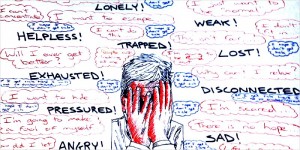In mid-October, I attended a Mental Health First Aid (MHFA) training course, which is available to all staff at King’s College London. The training course aims to (1) raise awareness of mental health, and (2) teach how to recognize and provide initial support to someone who is struggling.

Molly Davies
Research Assistant
A bit about me: my entire higher educational background is in psychology and psychological services. As such, I was excited to learn that King’s College London offers a Mental Health First Aid (MHFA) course to all of their employees. The MHFA organization first began in Australia in 2001 and since then has spread to 24 countries. It came to England in 2007 as part of a national movement to improve public mental health. One of my coworkers had taken it previously and highly recommended it. I needed very little convincing; I signed up for the course out of personal interest, but I was also curious to see how issues around mental illness were disseminated and explained to those outside the field.

The training course I attended lasted two full days, and the attendees were from all faculties at King’s College London and from all different backgrounds. The first thing I noticed, as soon as I entered the training room, was that we were all women (see Michela’s [Clarke, EDIT Lab placement student] blog post from earlier this week for more information on why this is not surprising, but is very significant). The second thing I noticed, as the course progressed, was that everyone was willing to be open and honest about their personal history and reasons for attending this course. Most people were there to learn how to support friends, family, and/or colleagues or students that they worked with on a daily basis.
For the most part, the course dealt with the topics that I would have expected. One of the more notable takeaways of the course itself was the idea of mental health vs. mental ill health.
Everyone has mental health.
The MHFA instructors emphasised the fact that everyone has mental health. Just as physical health does not only refer to infirmity, mental health does not only refer to mental disorders but rather to the whole spectrum of mental well-being and mental illness. We all fluctuate on this spectrum and at times, perhaps even from one day to the next, our mental health may change to mental ill health.
I greatly enjoyed all the activities, videos, and slides that the instructors utilised in order to teach us about the various mental health diagnoses, what they look like/feel like, how to recognize the signs in others, and what to do with someone in crisis and how to direct them to the appropriate professional services. The course does well at providing information and raising awareness of mental ill health.
“Awareness goes beyond stigma.”
As someone who has been studying mental health for years, I tend to forget that others are not as familiar with the topic and perhaps don’t know what is classed as a mental health disorder. Oftentimes in this field, the main issue we discuss around awareness is about stigma and the need to normalise mental illness so sufferers feel empowered to seek and ask for help when needed.
However, a potentially negative side effect of normalisation is people begin to think of their mental ill health as just that: normal. If you say everyone gets stressed, then that means I am weak if I feel overwhelmed by my own stresses. If you say everyone feels anxiety, then the fact that I feel anxiety on a daily basis isn’t cause for concern. In fact, one of my peers on the course was unaware that there was such a thing as clinical anxiety. It wasn’t that she felt she would be judged for seeking help; it was that she genuinely had no idea that her daily feelings of anxiety weren’t “normal”, and were something that she could seek help for.
“She genuinely had no idea that her daily feelings of anxiety weren’t “normal”.”
As it turns out, awareness isn’t only about making it acceptable to seek help, but also about realizing when something is, quote-on-quote, “normal”, and when there is a need to ask for assistance. Although the MHFA course was centered on teaching us to recognize the signs of someone else in crisis, a side benefit was learning to recognize those signs in yourself as well.
I would highly recommend the course to anyone.


